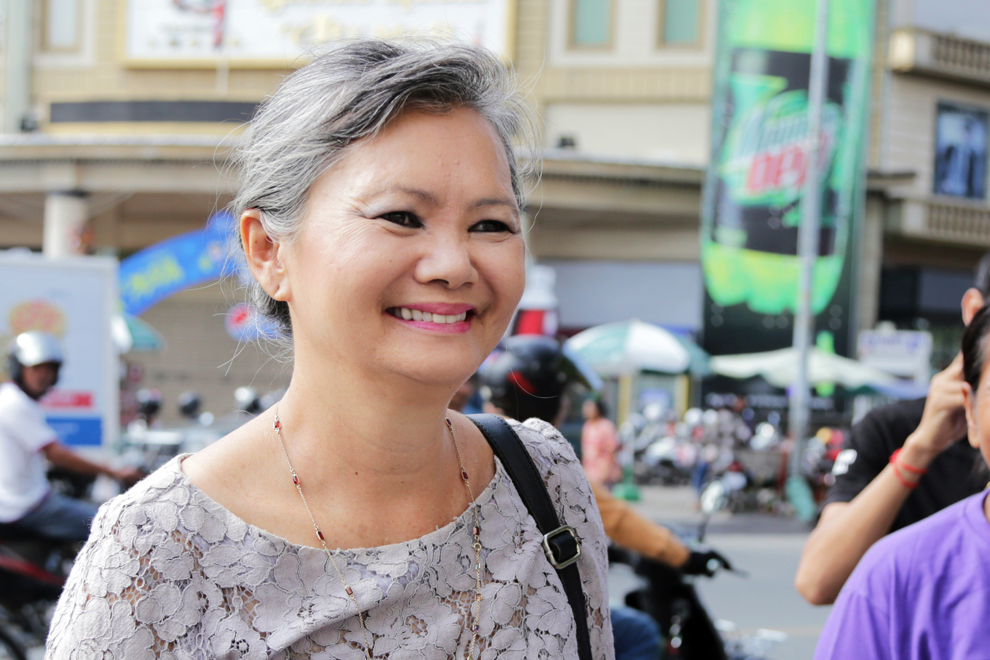
Former deputy leader of the Cambodia National Rescue Party (CNRP) Mu Sochua in 2017. Hong Menea
The deputy president of the Supreme Court-dissolved Cambodia National Rescue Party (CNRP), Mu Sochua, has written to the EU about alleged threats against CNRP acting President Sam Rainsy and other former party lawmakers and activists in Cambodia and abroad.
In a three-page letter sent on Monday to Federica Mogherini, the High Representative of the EU for Foreign Affairs and Security Policy and Vice President of the EU Commission, Sochua claimed there had been increased threats against Rainsy, in particular, through the court order for his arrest.
Rainsy fled to France where he has lived for several years to escape Cambodian court convictions and sentences.
“Inside Cambodia, opposition members and elected councillors are closely watched by local police and authorities. Those who are active on Facebook are warned or arrested for their comments, considered as ‘incitement’ or ‘fake news’,” she wrote.
She listed the names of more than 20 party members in the provinces who she claimed were threatened, including seven from Battambang, 16 from Banteay Meanchey and one from Kandal.
She cited the transfer of two teachers out of Kampong Thom for being affiliated with the CNRP and the arrest and pre-trial detention of former commune councillors in Sihanoukville province in a recent land conflict as proof of such threats. The arrest of activist Kong Mas was also included in her claims.
“We reiterate our support for discussions between the Hun Sen regime and the international community to bring democracy back on track. Sam Rainsy and all opposition members in exile will return to Cambodia to find solutions for national reconciliation and to defend democratic principles and liberal values,” she said.
Reached yesterday, Sochua refused to give a direct answer when asked why she wrote to Mogherini.
Instead, she claimed that the alleged threats and arrests were gross violations of human rights committed by the government of Prime Minister Hun Sen on members of the opposition.
She also said political rights were enshrined in the Constitution and that Rainsy’s return is also his right as a citizen and should be considered a solution to end what the opposition claim is a “political crisis”.
National Police spokesman Lieutenant General Chhay Kim Khoeun said on Monday that no activist of the former CNRP was questioned this month. But in past months, some people were questioned for violations against the Supreme Court verdict which dissolved the CNRP.
“Maybe last month there was such a case because they went against the verdict of the Supreme Court. We all know that the CNRP doesn’t exist anymore, but they still have activities."
“This means that they went against the court’s ruling. So we called them to be educated and warned them. It is not a threat,” he said.
He said the number of those who were educated and warned were not as high as Sochua claimed.
He said Sochua had obviously inflated the numbers and this only meant she was inciting people to move against Cambodian law.
“If they go against the law, the police will enforce the law. When we enforce the law, they should have been sent to court. But we are gentle and understand that our people don’t understand clearly about the law."
“So we just educated them. But if they are still defiant, we will enforce the law. As we all know, going against the law is illegal,” he stressed.
Government spokesperson Phay Siphan said on Monday that he did not care what Sochua had reported to the EU because the bloc is working with Cambodia as partners.
“It is her right to write to anyone. But the EU does not have any authority to control Cambodia. Cambodia took action according to the facts and with a legal basis,” he said, adding that the EU is in contact with the government.
“It is just [CNRP] psychological warfare and international diplomatic activities,” he said.
Political analyst Lao Mong Hay said Sochua’s letter was meant to inform the EU that Cambodia lacked democratic space despite the government’s recent actions, which the EU has regarded as positive.
Analyst Meas Nee echoed Mong Hay’s views. He said Sochua’s letter was designed to remind the EU about the Cambodian situation while the EU was in the process of withdrawing the Everything But Arms (EBA) tariff preferences for the Kingdom.
“It is not a new thing. It is just to highlight the CNRP’s demands, like what is attached to the EU’s conditions regarding the EBA. It is the only way the opposition can alert the EU,” he said.
Likewise, political analyst Em Sovannara said the letter to a third party like EU showed that Cambodians could not talk with each other and needed a third party to intervene.
“Now the CNRP has no other way to stop the power of the ruling party. So, it writes to the international community or [through] UN mechanisms. This reflects a state of being unable to talk Cambodian to Cambodian,” he said.














